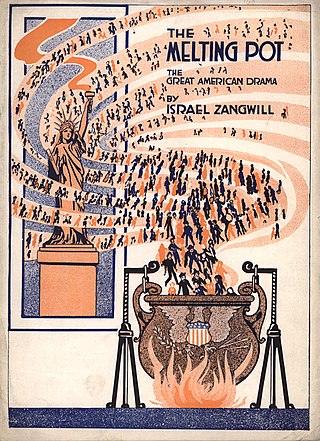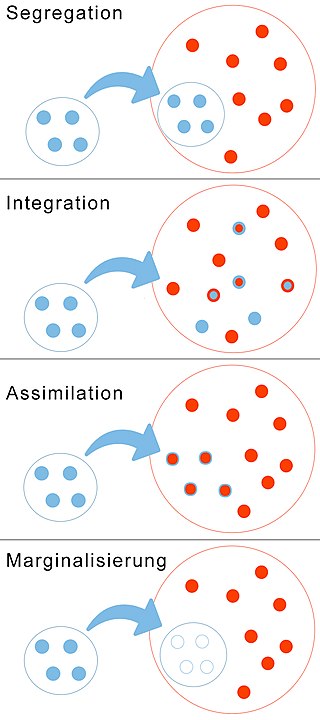Assimilation or Assimilate may refer to:
Assimilation or Assimilate may refer to:

A tradition is a belief or behavior passed down within a group or society with symbolic meaning or special significance with origins in the past. A component of cultural expressions and folklore, common examples include holidays or impractical but socially meaningful clothes, but the idea has also been applied to social norms such as greetings. Traditions can persist and evolve for thousands of years—the word tradition itself derives from the Latin tradere literally meaning to transmit, to hand over, to give for safekeeping. While it is commonly assumed that traditions have an ancient history, many traditions have been invented on purpose, whether that be political or cultural, over short periods of time. Various academic disciplines also use the word in a variety of ways.

A melting pot is a monocultural metaphor for a heterogeneous society becoming more homogeneous, the different elements "melting together" with a common culture; an alternative being a homogeneous society becoming more heterogeneous through the influx of foreign elements with different cultural backgrounds, possessing the potential to create disharmony within the previous culture. It can also create a harmonious hybridized society known as cultural amalgamation. Historically, it is often used to describe the cultural integration of immigrants to the United States. A related concept has been defined as "cultural additivity."

Acculturation is a process of social, psychological, and cultural change that stems from the balancing of two cultures while adapting to the prevailing culture of the society. Acculturation is a process in which an individual adopts, acquires and adjusts to a new cultural environment as a result of being placed into a new culture, or when another culture is brought to someone. Individuals of a differing culture try to incorporate themselves into the new more prevalent culture by participating in aspects of the more prevalent culture, such as their traditions, but still hold onto their original cultural values and traditions. The effects of acculturation can be seen at multiple levels in both the devotee of the prevailing culture and those who are assimilating into the culture.
Anglicisation is a form of cultural assimilation whereby something non-English becomes assimilated into, influenced by or dominated by Englishness or Britishness. It can be socio-cultural, where a non-English person, people or place adopt(s) the English language or English customs; institutional, where institutions are modified to resemble or replaced with the institutions of England or the United Kingdom; or linguistic, where a foreign term or name is altered to become easier to say in English. It can also refer to the influence of English culture and business on other countries outside England or the United Kingdom, including media, cuisine, popular culture, technology, business practices, laws, or political systems.
Cultural assimilation is the process in which a minority group or culture comes to resemble a society's majority group or assimilate the values, behaviors, and beliefs of another group whether fully or partially.
Intercultural communication is a discipline that studies communication across different cultures and social groups, or how culture affects communication. It describes the wide range of communication processes and problems that naturally appear within an organization or social context made up of individuals from different religious, social, ethnic, and educational backgrounds. In this sense, it seeks to understand how people from different countries and cultures act, communicate, and perceive the world around them. Intercultural communication focuses on the recognition and respect of those with cultural differences. The goal is mutual adaptation between two or more distinct cultures which leads to biculturalism/multiculturalism rather than complete assimilation. It promotes the development of cultural sensitivity and allows for empathic understanding across different cultures.

Forced assimilation is an involuntary process of cultural assimilation of religious or ethnic minority groups during which they are forced to adopt language, national identity, norms, mores, customs, traditions, values, mentality, perceptions, way of life, and often religion and ideology of established and generally larger community belonging to dominant culture by government. Also enforcement of a new language in legislation, education, literature, worshiping counts as forced assimilation. Unlike ethnic cleansing, the local population is not outright destroyed and may or may not be forced to leave a certain area. Instead the assimilation of the population is made mandatory. This is also called mandatory assimilation by scholars who study genocide and nationalism. Mandatory assimilation has sometimes been made a policy of new or contested nations, often during or in the aftermath of a war. Some examples are both the German and French forced assimilation in the provinces Alsace and Lorraine, and some decades after the Swedish conquests of the Danish provinces Scania, Blekinge and Halland the local population was submitted to forced assimilation, or even the forced assimilation of ethnic Teochews in Bangkok by the Siam government during World War I until the 1973 uprising.
Language shift, also known as language transfer or language replacement or language assimilation, is the process whereby a speech community shifts to a different language, usually over an extended period of time. Often, languages that are perceived to be higher status stabilise or spread at the expense of other languages that are perceived by their own speakers to be lower-status. An example is the shift from Gaulish to Latin during the time of the Roman Empire.
Bulgarisation, also known as Bulgarianisation is the spread of Bulgarian culture beyond the Bulgarian ethnic space. Historically, unsuccessful assimilation efforts in Bulgaria were primarily directed at Muslims, most notably Bulgarian Turks, but non-Islamic groups have also faced assimilation.
Social integration is the process during which newcomers or minorities are incorporated into the social structure of the host society.
Religious assimilation refers to the adoption of a majority or dominant culture's religious practices and beliefs by a minority or subordinate culture. It is an important form of cultural assimilation.

Americanization is the process of an immigrant to the United States becoming a person who shares American culture, values, beliefs, and customs by assimilating into the American nation. This process typically involves learning the American English language and adjusting to American culture, values, and customs.
Persianization or Persification, is a sociological process of cultural change in which a non-Persian society becomes "Persianate", meaning it either directly adopts or becomes strongly influenced by the Persian language, culture, literature, art, music, and identity as well as other socio-cultural factors. It is a specific form of cultural assimilation that often includes a language shift. The term applies not only to cultures, but also to individuals, as they acclimate to Persian culture and become "Persianized" or "Persified".
Jewish assimilation refers either to the gradual cultural assimilation and social integration of Jews in their surrounding culture or to an ideological program in the age of emancipation promoting conformity as a potential solution to historic Jewish marginalization.

Assimilation was a major ideological component of French colonialism during the 19th and 20th centuries. The French government promoted the concept of cultural assimilation to colonial subjects in the French colonial empire, claiming that by adopting French culture they would ostensibly be granted the full rights enjoyed by French citizens and be legally considered "French". Colonial settlements established by the French, such as the Four Communes in French West Africa, were created with the assimilation concept in mind, and while Africans living in such settlements were theoretically granted the full rights of French citizens, discriminatory policies from various French colonial administrations denied most of these rights to "full-blooded Africans".
Integrative communication theory is a theory of cross-cultural adaptation proposed by Young Yun Kim. The first widely published version of Kim's theory is found in the last three chapters of a textbook authored by William Gudykunst with Young Yun Kim as second author. See acculturation and assimilation.
Dutchification is the spread of the Dutch language, people or the culture of the Netherlands, either by force or cultural assimilation.
Bicultural identity is the condition of being oneself regarding the combination of two cultures. The term can also be defined as biculturalism, which is the presence of two different cultures in the same country or region. As a general term, culture involves the behaviors and belief characteristics of a particular social, ethnic, or age group. Within culture, we have cultural effects, which are the shared behaviors and customs we learn from the institutions around us. An example of a cultural effect would be how an individual's personality is strongly influenced by the biological and social norms he is exposed to. Another cultural effect would be that in some societies it would be more acceptable to dress or act in a certain way.

Malayisation or Malayization is a process of assimilation and acculturation, that involves acquisition or imposition of elements of Malay culture, in particular, Islam and the Malay language, as experienced by non-Malay populations of territories fully controlled or partially influenced by historical Malay sultanates and modern Malay-speaking countries. It is often described as a process of civilisational expansion, drawing a wide range of indigenous peoples into the Muslim, Malay-speaking polities of Maritime Southeast Asia. Examples of Malayisation have occurred throughout Asia including in Brunei, Cambodia, Indonesia, Malaysia, Singapore, and Sri Lanka.
Vietnamization or Vietnamisation is the acquisition or imposition of elements of Vietnamese culture, in particular the Vietnamese language and customs. This was experienced in some historic periods by the non-Vietnamese populations of territories controlled or substantially under the influence of Vietnam. As with other examples of cultural assimilation, it could either be voluntary or forced and is most visible in the case of territories where the Vietnamese language or culture were dominant or where their adoption could result in increased prestige or social status, as was the case of the nobility of Champa, or other minorities like Tai, Chinese and Khmers. To a certain extent Vietnamization was also administratively promoted by the authorities regardless of eras.